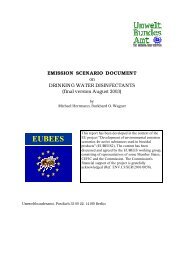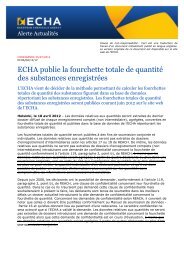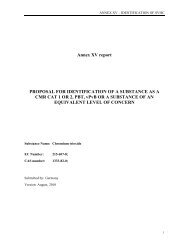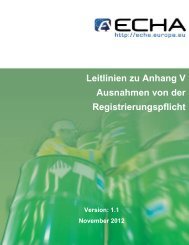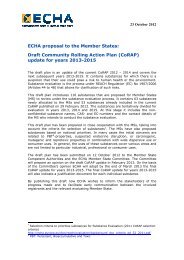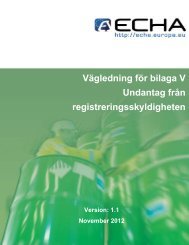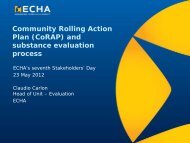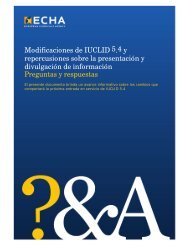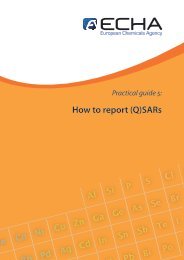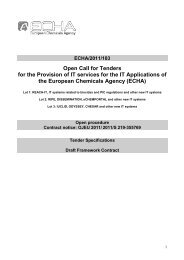Strategy For Limiting Risks Human Health Draft of ... - ECHA - Europa
Strategy For Limiting Risks Human Health Draft of ... - ECHA - Europa
Strategy For Limiting Risks Human Health Draft of ... - ECHA - Europa
You also want an ePaper? Increase the reach of your titles
YUMPU automatically turns print PDFs into web optimized ePapers that Google loves.
Mutagenicity<br />
Cryolite does not induce gene mutations in a bacterial in vitro system. In vitro tests on<br />
induction <strong>of</strong> chromosomal aberrations (human lymphocytes) and unscheduled DNA synthesis<br />
(rat hepatocytes) are reported to be negative, but cannot be adequately assessed because <strong>of</strong> the<br />
lack <strong>of</strong> full reports. In vivo cryolite was negative in rat bone marrow chromosomal aberration<br />
tests after acute and repeated inhalation exposure.<br />
In summary there is no reason for concern with respect to mutagenicity<br />
Carcinogenicity<br />
22<br />
Conclusion: ii<br />
In order that carcinogenicity studies with cryolite are not available and fluoride has been<br />
identified as the moity <strong>of</strong> toxicological concern, studies with fluorides other than cryolite are<br />
included for the risk assessment.<br />
Four carcinogenicity studies with sodium fluoride (two diet studies and two drinking water<br />
studies, see RAR-chapter 4.1.2.8.1) are available. From these studies with NaF in rats and<br />
mice it was concluded that “the available data are sufficient to suggest that fluoride is not a<br />
carcinogenic substance in animals." (EU risk assessment <strong>of</strong> hydrogen fluoride).<br />
Since the results with the oral studies with NaF give no indications that fluoride has a<br />
carcinogenic potential in animals, and taking into account that cryolite is not mutagenic there<br />
is no reason for concern for workers with regard to carcinogenicity <strong>of</strong> cryolite.<br />
Toxicity for reproduction<br />
Conclusion: ii<br />
Effects on fertility<br />
Cryolite was investigated for reproductive toxicity in a two-generation study in rats with<br />
dietary administration in the range <strong>of</strong> 15 to 150 mg/kg/day. Dental fluorosis as indication for<br />
fluoride accumulation occurred at all dose levels. The results <strong>of</strong> this study do not direct<br />
towards a specific potential <strong>of</strong> cryolite to cause adverse effect to fertility. During a study with<br />
repeated inhalation <strong>of</strong> cryolite in rats also organs <strong>of</strong> the reproductive system have been<br />
evaluated. No substance-related effects on these organs were observed up to an air<br />
concentration <strong>of</strong> 4.6 mg/m 3 . Fluoride concentrations in bones and tooth samples, however,<br />
were increased at that dose.<br />
In summary there is no indication for fertility risks caused by cryolite, a quantitative<br />
assessment is not deemed necessary, there is no concern for workers from this aspect.<br />
Conclusion: ii






